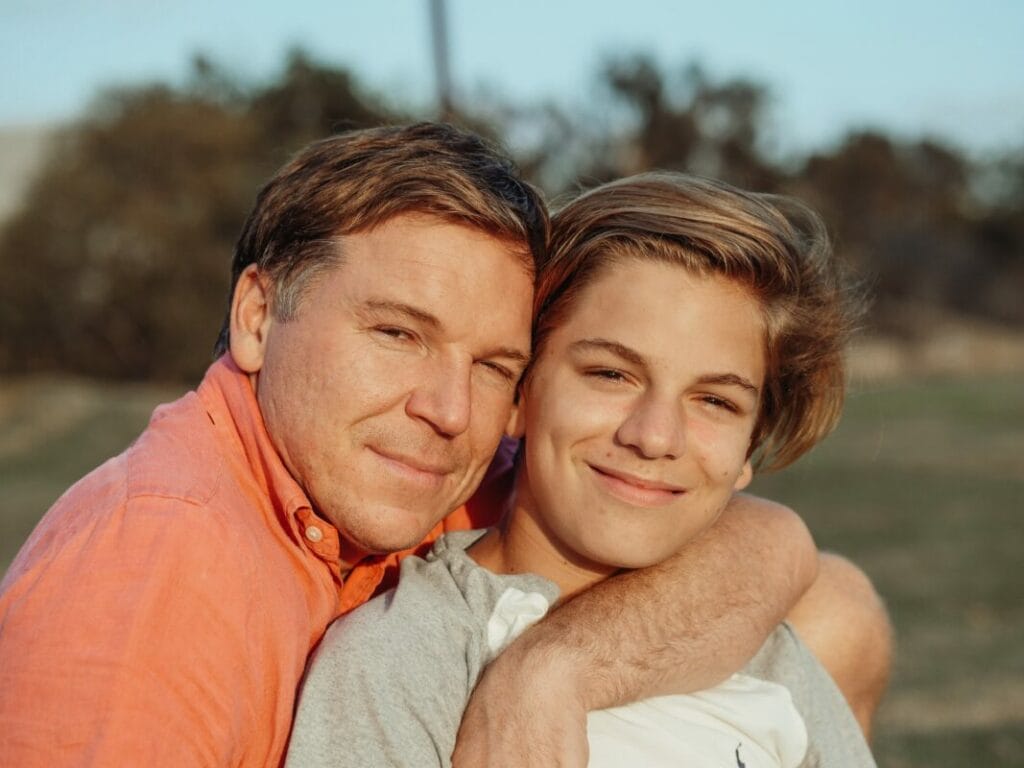We’re often asked by parents what they can do to “just get my kids to open up and TALK to me!” The answer is simple but not easy: You must become a good listener.
What to Consider Before You Talk
First, become aware of what you are communicating nonverbally through your body language, tone of voice, and the words you choose to use.
If you ask your child if they would like to go to the park, the child may respond by side-eyeing you and cautiously saying, “Okaaaaay.” Then again, it may be a matter of fact, “Ok,” with a shrug. Or, they could jump up and down with an excited, “Ok!!!” The exact same word will be interpreted differently based on the other non-verbal cues.
The same goes for you as the parent. How you say what you say often determines whether or not your child will open up. If they feel judgment, sarcasm, or dismissiveness from you, they will likely shut down and not want to talk. If instead, they feel openness, curiosity, and kindness from you, your child will feel safe to share what’s on their mind.
You must also consider your child or teen’s point of view when speaking with them. Everyone, even a child, has a perspective that seems 100% right to them. They usually aren’t against you; they just see things differently, and that’s not a bad thing.

How to Begin Talking
Once you’re aware of these two points, it’s time to get your child or teen’s attention. Even if your child or teen doesn’t look busy, they are actually busy thinking about something that is important to them. So how do we gain their attention?
Imagine you’re a teen. You are busy thinking about a conversation at school today and how you didn’t know the answer to the discussion question on your history test. In this scenario, which of the following sounds kinder?
“Did you want to apply for summer jobs?” or “Excuse me, (name). [Wait for teen to answer and look in your eyes.] I’d like to ask you a question. Is now a good time, or would later be better? [Wait for them to say now is good.] Thanks. I was wondering if you’d like to apply for summer jobs.”
While the first option is jarring, the second option gives your teen a chance to slowly shift their focus and mindset to be able to hear and consider what you’re saying.
What Not to Say When You Talk
When you speak to your child or teen, try to avoid saying, “Why,” “But,” and “No.” If you just rolled your eyes because this sounds overly permissive, hang in there with me.
The word, “Why?” can feel like an attack. “Why did you do that?!” Feel that tension? Instead, consider saying, “…Because…?” or “How come?” Or “I’m sure you had good reasons for what you did. Can you tell me what they are?”
The word, “But” can be problematic as well because it negates everything you said before it. Instead of “but,” consider using “and.”
And lastly, the word “no” can dash a kid’s hopes and dreams from the start. Consider using qualifiers instead. For example, “Ask me again when you finish emptying the trash.” Or, “I’d like to say yes, but I have some concerns. Can you guess what they are?”

What to Say When You Talk
Now that we’ve covered what not to say, let’s cover what you should say. The first words are something I’m sure you’ve told your child or teen a thousand times. Say, “Thank you.”
What does this look like? Well, when your teen tells you they finished their homework, don’t ignore them or huff, “Finally!” Instead, say, “Thank you.” “Thank you for sharing.” “Thanks for letting me know.” “Thanks for taking the time to let me know.” Acknowledge and appreciate.
How to Listen
The most powerful listening tool is reflective listening. It is also called active listening or empathic listening. When your child says something to you, first, clarify. “I think what I heard you say is ___________.” Next, confirm that your understanding is correct: “Did I get that right?” And thirdly, ask, “What else?” Use affirming responses like, “Oh,” “I see,” and “Really?”
If what they are saying is not clear to you, ask clarifying questions. Group their answers together to make sense of them. Check to see if you understand the feeling underneath their words. See if you can figure out what really matters to them. Allow space and silence–as hard as it is–so they can think.
Questions also keep children and teens using the frontal lobe of their brain, which controls language and reasoning (as opposed to the amygdala, which is ALL THE EMOTIONS and none of the reason). “What did I ask you to do?” “Do you need a redo?” “Are you asking or telling?” “Who has a problem with that?” “I wonder if that’s true?”
Then, when the conversation is over, thank them for sharing with you. “Thank you for sharing that with me. That means a lot to me.” “I enjoyed our conversation.” “I liked hearing about that.” “Thanks for talking.”
How to De-escalate a Situation
But what do you do when everything blows up? Your teen yells, “You never let me go out with my friends! You are such a helicopter parent!” And you yell back, “That’s not true! You went out last week! And, besides, you failed your history test!” The situation is escalating, emotions are running high, and everyone is taking things personally. These situations lead to heartache and bad feelings later. There’s a better way.
You can de-escalate a conversation by calming your body and using neutral responses: “You might be right.” “Thank you for letting me know.” “Could be.” “Well, there you go.” “Probably so.” “That could be true.” “I love you too much to argue.” “Thanks for telling me how you feel.” “I know.” “The world is full of surprises.” “I’m sure you’ll figure it out.” “If by chance I’m wrong, I’ll make it up to you.” “Uh oh!” “Oh, sweetie, I’m not going to make you. You will have to make yourself.”
Sometimes the best response is no response at all; just smile and walk away then revisit the conversation at a later time.

When to Ask for Help
If you feel like your relationship with your child or teen is “too far gone,” or if you want insight into your specific situation, seek out family counseling. Let an experienced therapist help your family rebuild trust and heal turbulent relationships.
And if you’re thinking, “What if my kid refuses to go to counseling?” Seek out a counselor yourself. As you become vulnerable, your child or teen will, too.
The Finding Place Counseling and Recovery is located in Little Rock, Arkansas. Our therapists offer both secular and Christian counseling for children, teens, and their families. Contact us to schedule a session or book an intensive.
